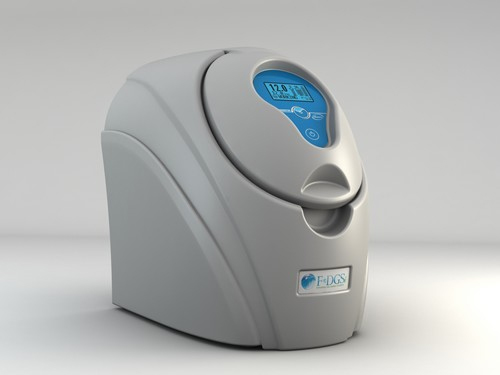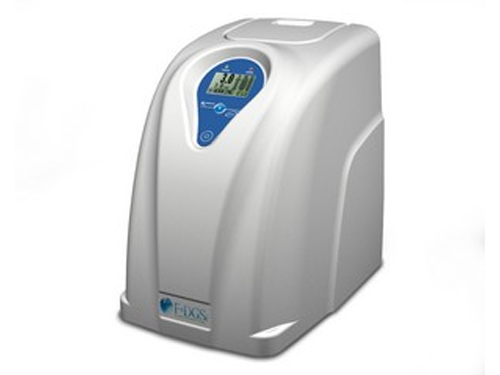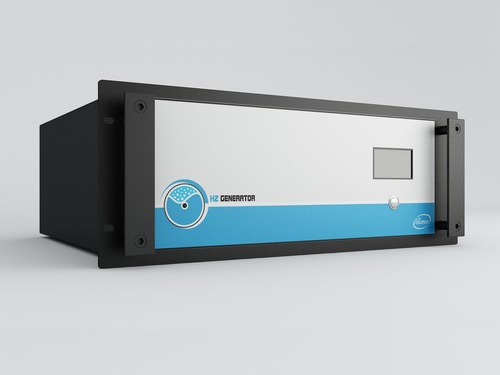| RANGE | : | WM-H2 |
|---|---|---|
| APPLICATION | : | GC – FID , GC – NPD , GC – FPD , GC – TCD , GC , GC-MS , ICP-MS , COLISION CELL , THA , HYDROGENATION , FAST-GC , FUEL CELL |
| GAZ TYPE | : | HYDROGEN |
| TECHNOLOGY | : | AUTO-DRYING TECHNOLOGY |
| PROCESS | : | High Purity Hydrogen generator with auto-drying technology The WM-H2 series hydrogen generators use the latest polymer electrolyte membrane (PEM) technology to produce pure hydrogen. The exclusive double gas column dryer regeneration system eliminates all down time for maintenance that is typical of other systems on the market, guaranteeing the best hydrogen purity at all times. Hydrogen is produced using deionised water from hydrolysis, through a polymer membrane. Electrolytic dissociation separates the water into its two main components: hydrogen ready for analytical use, and oxygen that is released into the air. No acid nor alkaline solutions are used in the hydrogen generation cycle. |


| RANGE | : | WM-H2 |
|---|---|---|
| APPLICATION | : | GC – FID , GC – NPD , GC – FPD , GC – TCD , GC , GC-MS , ICP-MS , COLISION CELL , THA , HYDROGENATION , FAST-GC , FUEL CELL |
| GAZ TYPE | : | HYDROGEN |
| TECHNOLOGY | : | AUTO-DRYING TECHNOLOGY |
| PROCESS | : | High Purity Hydrogen generator with auto-drying technology The WM-H2 series hydrogen generators use the latest polymer electrolyte membrane (PEM) technology to produce pure hydrogen. The exclusive double gas column dryer regeneration system eliminates all down time for maintenance that is typical of other systems on the market, guaranteeing the best hydrogen purity at all times. Hydrogen is produced using deionised water from hydrolysis, through a polymer membrane. Electrolytic dissociation separates the water into its two main components: hydrogen ready for analytical use, and oxygen that is released into the air. No acid nor alkaline solutions are used in the hydrogen generation cycle. |
PAR-H2
| RANGE | : | PAR-H2 |
|---|---|---|
| APPLICATION | : | GC – FID , GC – NPD , GC – FPD , GC – TCD , GC , GC-MS , ICP-MS , COLISION CELL , THA , HYDROGENATION , FAST-GC , FUEL CELL |
| GAZ TYPE | : | HYDROGEN |
| TECHNOLOGY | : | PROGRAMMABLE AUTO REGENERATING CATRIDGE |
| PROCESS | : | High Purity Hydrogen generator with programmable auto regeneration cartridge The PAR-H2 series hydrogen generators use the latest polymer electrolyte membrane (PEM) technology to produce pure hydrogen. The unit use a single column dryer with programmable automatic regeneration via integrated calendar events. Hydrogen is produced using deionised water from hydrolysis, through a polymer membrane. Electrolytic dissociation separates the water into its two main components: hydrogen ready for analytical use, and oxygen that is released into the air. No acid nor alkaline solutions are used in the hydrogen generation cycle. |


| RANGE | : | PAR-H2 |
|---|---|---|
| APPLICATION | : | GC – FID , GC – NPD , GC – FPD , GC – TCD , GC , GC-MS , ICP-MS , COLISION CELL , THA , HYDROGENATION , FAST-GC , FUEL CELL |
| GAZ TYPE | : | HYDROGEN |
| TECHNOLOGY | : | PROGRAMMABLE AUTO REGENERATING CATRIDGE |
| PROCESS | : | High Purity Hydrogen generator with programmable auto regeneration cartridge The PAR-H2 series hydrogen generators use the latest polymer electrolyte membrane (PEM) technology to produce pure hydrogen. The unit use a single column dryer with programmable automatic regeneration via integrated calendar events. Hydrogen is produced using deionised water from hydrolysis, through a polymer membrane. Electrolytic dissociation separates the water into its two main components: hydrogen ready for analytical use, and oxygen that is released into the air. No acid nor alkaline solutions are used in the hydrogen generation cycle. |
ND-H2
| RANGE | : | ND-H2 |
|---|---|---|
| APPLICATION | : | GC – FID , GC – NPD , GC – FPD , GC – TCD , THA , FUEL CELL |
| GAZ TYPE | : | HYDROGEN |
| TECHNOLOGY | : | DESSICANT CATRIDGE |
| PROCESS | : | Hydrogen generator with dessicant cartridge The ND-H2 series hydrogen generators use the latest polymer electrolyte membrane (PEM) technology to produce pure hydrogen. The unit use a desiccant cartridge which needs to be refilled or replaced when saturated. Hydrogen is produced using deionised water from hydrolysis, through a polymer membrane. Electrolytic dissociation separates the water into its two main components: hydrogen ready for analytical use, and oxygen that is released into the air. No acid nor alkaline solutions are used in the hydrogen generation cycle. |


| RANGE | : | ND-H2 |
|---|---|---|
| APPLICATION | : | GC – FID , GC – NPD , GC – FPD , GC – TCD , THA , FUEL CELL |
| GAZ TYPE | : | HYDROGEN |
| TECHNOLOGY | : | DESSICANT CATRIDGE |
| PROCESS | : | Hydrogen generator with dessicant cartridge The ND-H2 series hydrogen generators use the latest polymer electrolyte membrane (PEM) technology to produce pure hydrogen. The unit use a desiccant cartridge which needs to be refilled or replaced when saturated. Hydrogen is produced using deionised water from hydrolysis, through a polymer membrane. Electrolytic dissociation separates the water into its two main components: hydrogen ready for analytical use, and oxygen that is released into the air. No acid nor alkaline solutions are used in the hydrogen generation cycle. |
LC-H2
| RANGE | : | LC-H2 |
|---|---|---|
| APPLICATION | : | GC – FID , GC – NPD , GC – FPD , GC – TCD , THA , FUEL CELL |
| GAZ TYPE | : | HYDROGEN |
| TECHNOLOGY | : | DESSICANT CATRIDGE |
| PROCESS | : | Mini Hydrogen generator with dessicant cartridge The LC-H2 hydrogen generators use the latest polymer electrolyte membrane (PEM) Technology to produce pure hydrogen. The unit use a desiccant cartridge which needs to be refilled or replaced when saturated. Hydrogen is produced using deionised water from hydrolysis, through a polymer membrane. Electrolytic dissociation separates the water into its two main components: hydrogen ready for analytical use, and oxygen that is released into the air. No acid nor alkaline solutions are used in the hydrogen generation cycle. |


| RANGE | : | LC-H2 |
|---|---|---|
| APPLICATION | : | GC – FID , GC – NPD , GC – FPD , GC – TCD , THA , FUEL CELL |
| GAZ TYPE | : | HYDROGEN |
| TECHNOLOGY | : | DESSICANT CATRIDGE |
| PROCESS | : | Mini Hydrogen generator with dessicant cartridge The LC-H2 hydrogen generators use the latest polymer electrolyte membrane (PEM) Technology to produce pure hydrogen. The unit use a desiccant cartridge which needs to be refilled or replaced when saturated. Hydrogen is produced using deionised water from hydrolysis, through a polymer membrane. Electrolytic dissociation separates the water into its two main components: hydrogen ready for analytical use, and oxygen that is released into the air. No acid nor alkaline solutions are used in the hydrogen generation cycle. |
RACK-WM-H2
| RANGE | : | RACK-WM-H2 |
|---|---|---|
| APPLICATION | : | GC – FID , GC – NPD , GC – FPD , GC – TCD , GC , GC-MS , ICP-MS , COLISION CELL , THA , HYDROGENATION , FAST-GC , FUEL CELL |
| GAZ TYPE | : | HYDROGEN |
| TECHNOLOGY | : | AUTO-DRYING TECHNOLOGY |
| PROCESS | : | Rackable hydrogen generator with auto-drying technology The RACK-H2 hydrogen generators use the latest polymer electrolyte membrane (PEM) technology to produce pure hydrogen. The WM-H2 series use the exclusive double gas column dryer regeneration system eliminates all down time for maintenance that is typical of other systems on the market, guaranteeing the best hydrogen purity at all times. Hydrogen is produced using deionised water from hydrolysis, through a polymer membrane. Electrolytic dissociation separates the water into its two main components: hydrogen ready for analytical use, and oxygen that is released into the air. No acid nor alkaline solutions are used in the hydrogen generation cycle. |


| RANGE | : | RACK-WM-H2 |
|---|---|---|
| APPLICATION | : | GC – FID , GC – NPD , GC – FPD , GC – TCD , GC , GC-MS , ICP-MS , COLISION CELL , THA , HYDROGENATION , FAST-GC , FUEL CELL |
| GAZ TYPE | : | HYDROGEN |
| TECHNOLOGY | : | AUTO-DRYING TECHNOLOGY |
| PROCESS | : | Rackable hydrogen generator with auto-drying technology The RACK-H2 hydrogen generators use the latest polymer electrolyte membrane (PEM) technology to produce pure hydrogen. The WM-H2 series use the exclusive double gas column dryer regeneration system eliminates all down time for maintenance that is typical of other systems on the market, guaranteeing the best hydrogen purity at all times. Hydrogen is produced using deionised water from hydrolysis, through a polymer membrane. Electrolytic dissociation separates the water into its two main components: hydrogen ready for analytical use, and oxygen that is released into the air. No acid nor alkaline solutions are used in the hydrogen generation cycle. |
RACK-ND-H2
| RANGE | : | RACK-ND-H2 |
|---|---|---|
| APPLICATION | : | GC – FID , GC – NPD , GC – FPD , GC – TCD , THA , GC |
| GAZ TYPE | : | HYDROGEN |
| TECHNOLOGY | : | DESSICANT TECHNOLOGY |
| PROCESS | : | Rackable Hydrogen generator with dessicant cartridge The RACK-H2 hydrogen generators use the latest polymer electrolyte membrane (PEM) technology to produce pure hydrogen. The ND-H2 series use a desiccant cartridge which needs to be refilled or replaced when saturated. Hydrogen is produced using deionised water from hydrolysis, through a polymer membrane. Electrolytic dissociation separates the water into its two main components: hydrogen ready for analytical use, and oxygen that is released into the air. No acid nor alkaline solutions are used in the hydrogen generation cycle. |


| RANGE | : | RACK-ND-H2 |
|---|---|---|
| APPLICATION | : | GC – FID , GC – NPD , GC – FPD , GC – TCD , THA , GC |
| GAZ TYPE | : | HYDROGEN |
| TECHNOLOGY | : | DESSICANT TECHNOLOGY |
| PROCESS | : | Rackable Hydrogen generator with dessicant cartridge The RACK-H2 hydrogen generators use the latest polymer electrolyte membrane (PEM) technology to produce pure hydrogen. The ND-H2 series use a desiccant cartridge which needs to be refilled or replaced when saturated. Hydrogen is produced using deionised water from hydrolysis, through a polymer membrane. Electrolytic dissociation separates the water into its two main components: hydrogen ready for analytical use, and oxygen that is released into the air. No acid nor alkaline solutions are used in the hydrogen generation cycle. |
